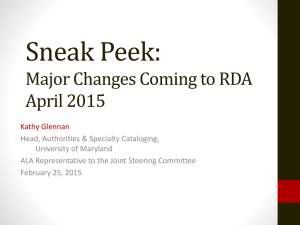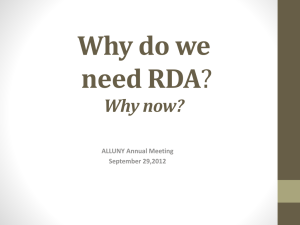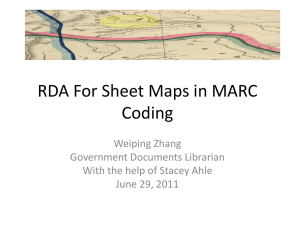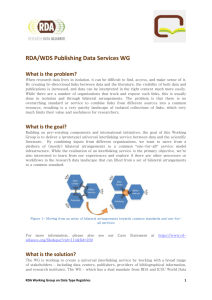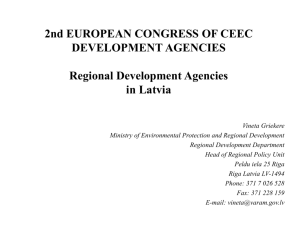june2011
advertisement
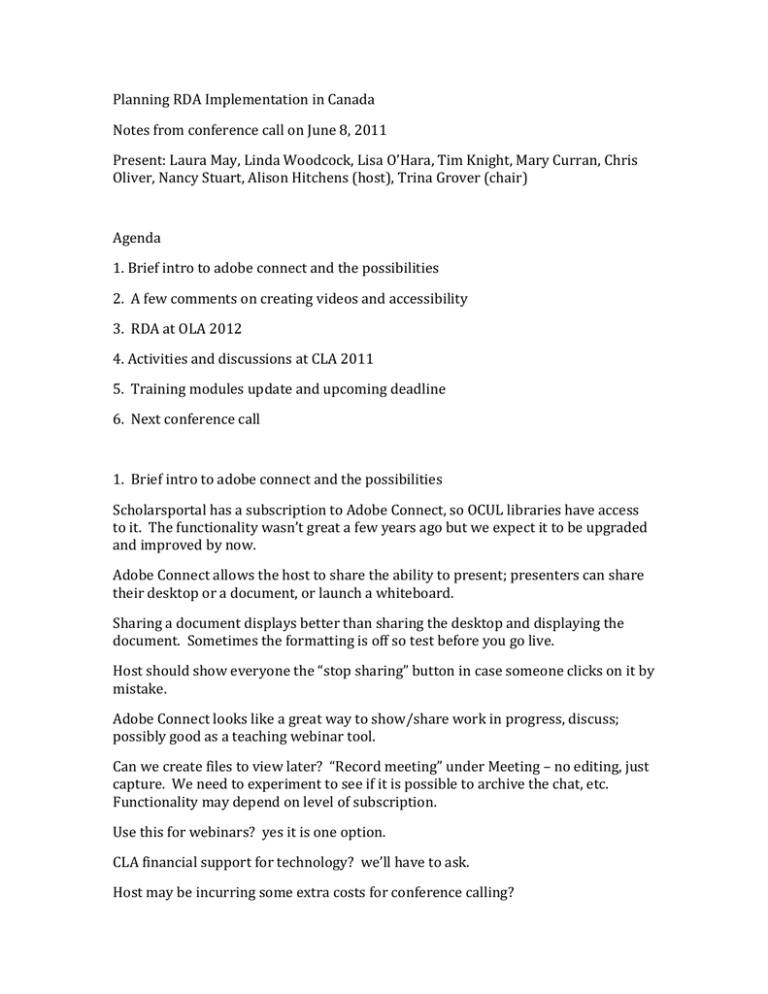
Planning RDA Implementation in Canada Notes from conference call on June 8, 2011 Present: Laura May, Linda Woodcock, Lisa O’Hara, Tim Knight, Mary Curran, Chris Oliver, Nancy Stuart, Alison Hitchens (host), Trina Grover (chair) Agenda 1. Brief intro to adobe connect and the possibilities 2. A few comments on creating videos and accessibility 3. RDA at OLA 2012 4. Activities and discussions at CLA 2011 5. Training modules update and upcoming deadline 6. Next conference call 1. Brief intro to adobe connect and the possibilities Scholarsportal has a subscription to Adobe Connect, so OCUL libraries have access to it. The functionality wasn’t great a few years ago but we expect it to be upgraded and improved by now. Adobe Connect allows the host to share the ability to present; presenters can share their desktop or a document, or launch a whiteboard. Sharing a document displays better than sharing the desktop and displaying the document. Sometimes the formatting is off so test before you go live. Host should show everyone the “stop sharing” button in case someone clicks on it by mistake. Adobe Connect looks like a great way to show/share work in progress, discuss; possibly good as a teaching webinar tool. Can we create files to view later? “Record meeting” under Meeting – no editing, just capture. We need to experiment to see if it is possible to archive the chat, etc. Functionality may depend on level of subscription. Use this for webinars? yes it is one option. CLA financial support for technology? we’ll have to ask. Host may be incurring some extra costs for conference calling? If incorporating screenshots from the Toolkit, there is some copyright information on the Toolkit site. Tutorials on how to use the toolkit are available on the site. Are we duplicating effort? whether or not we actually produce a video the powerpoint will still be a useful component to our modules and can include a link to the ALA webinars available online. Regional and provincial associations are our best bet for disseminating information and coordinating workshops. 2. A few comments on creating videos and accessibility Everything we produce must be accessible. Some points: make sure you have a lot of white space and good contrast; coloured font should be bolded as well, since colour-blind people won’t see the highlight; don’t put every single point on the slide, keep them as concise as possible, talk about the points. Consider distributing your speakers notes beforehand so that people are re-assured that they have all of the important points. 3. RDA at OLA 2012 Alison proposed a full day pre-conference and 2 conference sessions. The program committee received a lot of proposals this year so we may get only the preconference. FYI here they are: a) Cataloguing with RDA Session Abstract: This full-day session will deliver four hands-on training modules on cataloguing with RDA. Learn to record attributes of manifestations, items, works and expressions; learn to create or use authority records by recording attributes of persons, families, corporate bodies and places; and learn to identify and record relationships in both bibliographic and authority records. This session is interactive and will include time for exercises Session Format Comments : the RDA Toolkit is an online product so to have a true interactive session with exercises it would be best to hold this in a computer lab. Perhaps either Ryerson or U of T would be willing to provide a space. suggested speakers: Mary Curran (University of Ottawa), Lisa O'Hara (University of Manitoba), Alison Hitchens (University of Waterloo), Chris Oliver (McGill University). However, we could source other Ontario librarians such as Trina Grover (Ryerson), Tim Knight (York), Marcia Salmon (York) if needed. b) RDA for Technical Services Managers Session Abstract: RDA implementation in Canada is anticipated for 2012. As managers you require information on implementing the new cataloguing code. Come and think about preparing your staff and systems for the transition from AACR2 to RDA. Issues such as organizing staff training, preparing the ILS for RDA metadata, changes to policies and procedures for original and copy cataloguing, impact on outsourced cataloguing, and overall costs and benefits will be discussed. suggested speaker: Trina Grover (Ryerson University) c) RDA for Public Services Staff Session Abstract: This RDA thing is just for cataloguers, right? Actually, public services staff need information about changes in the new cataloguing code because bibliographic records will look different and contain new content. Come and learn about changes from AACR2 to RDA and how they will affect you and your users! Learn how you can contribute to changes in cataloguing policies. Learn about the potential RDA holds for improving discovery and access. suggested speaker: Tim Knight (York University) 4. Activities and discussions at CLA 2011 The sessions went well. Trina will send her notes from the brunch with Gordon Dunsire. He seems amenable to working with us again.. We have some linked data knowledge in the country – 2 recent articles: Tim Knight http://pi.library.yorku.ca/dspace/handle/10315/6760 ; Lisa Goddard and Gillian Byrne (Memorial U) http://www.dlib.org/dlib/november10/byrne/11byrne.html 33X discussion; ideas and strategies for local implementation and recon of gmd fields; effect of discovery layers on the whole thing; on-the-fly generation of icons. Nancy’s library uses Summon, next release will allow us to have more control. Laura shared a decisions document created by LAC and posted it to the RDA wiki. 5. Training modules update and upcoming deadline, August 1st. Alison welcomes links to anything we can find on identifying places, seems like no one has tackled this yet. Mary suggests we use LC modules speakers notes and modify the slides. No word from OLA about EI webinars lately. Our choices re: software options are still under consideration and we are open to suggestions. We would like to include screenshots of preferred sources; also answers should include various options, or speaker’s notes about the options. Linda: new avenues and contacts for the West coast, trainers will be busy. TSIG will become a CLA network. Details are in the TSIG AGM minutes on the wiki (soon!) We are not in a position to create content for the LIS teaching community but we will add information and links to resources to the RDA wiki, and encourage them to attend the workshops that we coordinate. 6. Next conference call – Trina will set up a doodle Adjourned at 3:27pm
